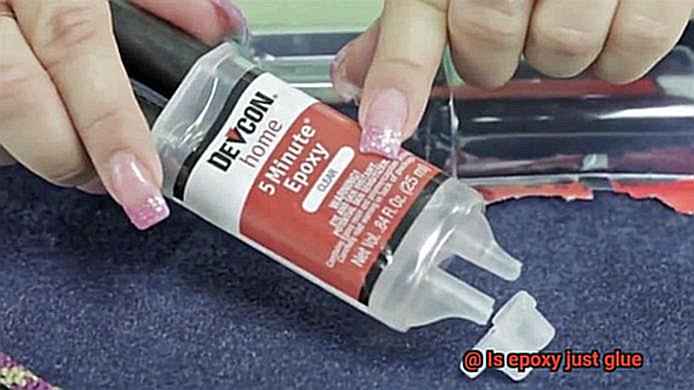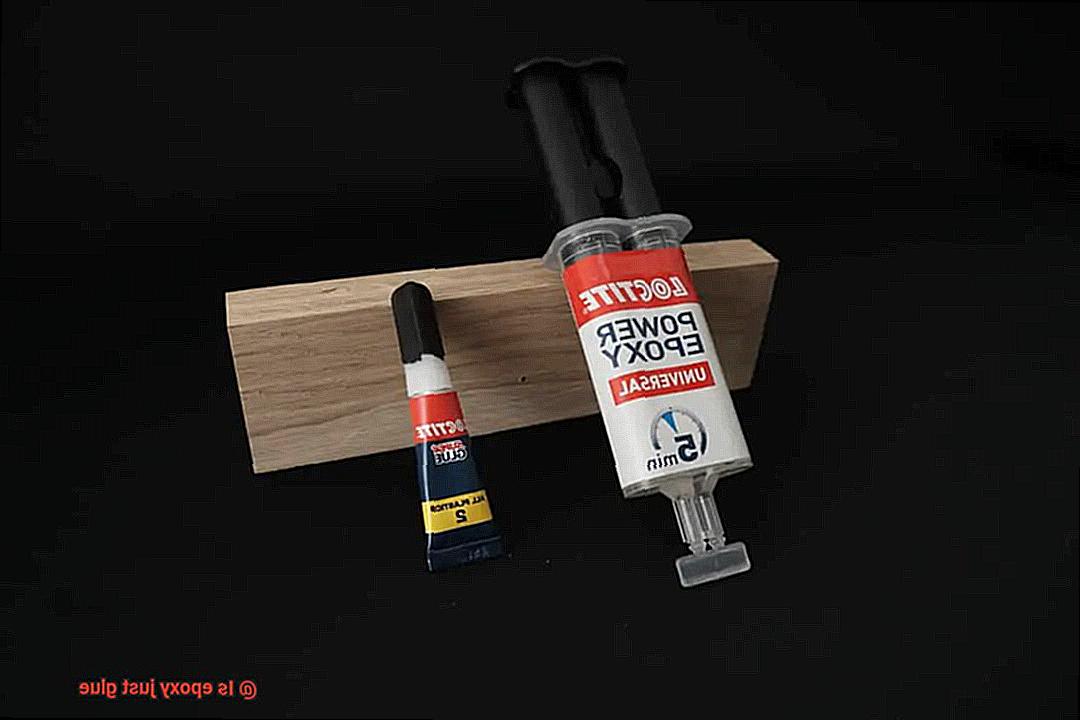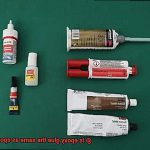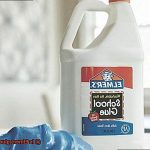Have you ever found yourself wandering around a hardware store, only to come across the terms “epoxy” and “glue” on various products? While these two terms may seem interchangeable, they have distinct differences in their purpose and application. So, the question remains: is epoxy just glue? Brace yourself for the answer.
At first glance, it’s easy to mistake epoxy for your everyday glue. However, epoxy is far from simple. It’s a versatile adhesive that’s used for a variety of purposes – from fixing small household items to bonding heavy-duty machinery. In fact, epoxy is so powerful and reliable that it’s often used in industrial applications.
What sets epoxy apart from traditional glue is its unique composition. Epoxy consists of two parts – a resin and a hardener. When mixed together, they undergo a chemical reaction that causes the mixture to harden into an incredibly strong and durable bonding agent.
So what does this mean for you? Well, if you’re looking for an adhesive that can handle tough jobs with ease, then epoxy should be your go-to choice. Whether you need to fix a broken piece of furniture or bond metal parts together, epoxy has got you covered.
In this blog post, we’ll delve deeper into the differences between epoxy and glue. We’ll explore what makes them unique and when it’s best to use one over the other. So if you’re curious about the world of adhesives and want to learn more about the wonders of epoxy, then keep reading.
What is Epoxy?
Contents
Epoxy is a game-changing adhesive that revolutionized the way we bond materials together. Unlike traditional glue, epoxy is a two-part adhesive that consists of a resin and hardener that are mixed together before use. Once combined, the two components undergo a chemical reaction that causes the epoxy to harden and bond strongly to the surfaces being joined.
Known for its exceptional strength and durability, epoxy adhesives are the go-to choice for tough and demanding applications. It can be used on a wide variety of surfaces, including metal, wood, plastic, glass, and ceramics. Epoxy is a popular choice in industries such as aerospace, automotive, and construction due to its incredible strength and resistance to harsh environments.
One of the key advantages of epoxy over glue is the type of bond it creates. Epoxy creates a chemical bond between the materials being joined, which makes it stronger and more durable than glue. Glue creates a physical bond that can break down over time when exposed to moisture or heat.
Epoxy’s ability to fill gaps and cracks in surfaces makes it ideal for use in repairs where a strong and lasting bond is required. Additionally, epoxy is resistant to water, chemicals, and heat, making it suitable for use even in the harshest environments.
Although epoxy may take longer to cure than glue, once it has cured, it forms an incredibly strong bond that can last for years. This makes it an excellent choice for applications where strength and durability are essential.
What is Glue?
Glue is a type of adhesive that is used to bond two or more surfaces together. It can be found in various forms such as liquid, gel, or solid. Depending on the materials being bonded and the type of glue used, the adhesive strength can vary.
While glue has been around for centuries, modern synthetic glues have revolutionized its capabilities. These glues are made from materials like polyurethane, epoxy, and cyanoacrylate, which are much stronger than natural glues made from animal hides and bones. They also have properties like water resistance and quick drying times that make them more effective.
The uses of glue are diverse and span across numerous industries. Here are just a few examples of how glue is utilized:
- Woodworking: Glue can join pieces of wood together, making it a crucial tool for furniture makers, carpenters, and cabinet makers.
- Construction: Glue helps bond materials like concrete, stone, and metal together in construction projects. It can also be used to install tiles and flooring.
- Manufacturing: Glue is frequently used in the production of products like automobiles and electronics. It helps bond different parts together and creates a more secure finished product.
There are several types of glue available in the market today, each with its unique properties and strengths. Some of the most popular glues include:
- White Glue: Often used in schools and households, white glue is ideal for paper-based projects.
- Super Glue: Also known as cyanoacrylate glue, it dries quickly and creates a strong bond on non-porous surfaces like plastic or metal.
- Epoxy Glue: This two-part adhesive is perfect for bonding materials that require high strength and durability.
The Difference between Epoxy and Glue
Epoxy and glue are two adhesives that are often used interchangeably, but they are not the same thing. As an expert in this field, let me guide you through the differences between them.
Strength is a critical factor when selecting an adhesive. Epoxy is well-known for its incredible bonding strength, making it ideal for heavy-duty applications such as construction and manufacturing. Glue, on the other hand, may not be as strong or durable as epoxy and may not be suitable for use in certain applications.
Curing time is also an essential consideration. Epoxy typically takes longer to cure than glue. Although this may be perceived as a disadvantage in some situations, it provides a stronger bond and can be used in applications where a fast-drying adhesive may not be suitable.
Chemical composition is another critical factor that distinguishes epoxy from glue. Epoxy consists of two parts: resin and hardener. When these components are mixed together, they react chemically to form a strong bond. In contrast, glue can be made from a variety of substances such as animal hide, plant-based materials, or synthetic materials.
To summarize, epoxy and glue have distinct differences in terms of strength, curing time, and chemical composition. Understanding these differences can help you select the right adhesive for your project.
If you require a strong, durable bond for heavy-duty applications, epoxy is likely the best choice for you. However, if you need a quick-drying adhesive for lighter applications, glue may be more appropriate.
Advantages of Using Epoxy
This two-part adhesive has many advantages over traditional glues that are worth exploring.
Firstly, the strength and durability of epoxy is unmatched. It can bond almost any material together, including metal, wood, plastic, and concrete. In addition, it is resistant to water, chemicals, and other harsh environmental conditions. This makes it an ideal choice for industrial and commercial applications where reliability is crucial.
The versatility of epoxy is yet another advantage. It can be used for a wide range of applications, making it an essential tool in any toolbox. From repairing cracks and holes in concrete to bonding metal and plastic parts together, and even creating decorative finishes on floors and countertops, the possibilities are endless.
Furthermore, ease of use is another advantage of using epoxy. Unlike traditional glues that require clamping or other special tools to ensure a strong bond, epoxy can be applied directly to the surface and will bond quickly and easily. This makes it a practical option for DIY enthusiasts as well as professionals.
Lastly, although it may be more expensive than traditional glues upfront, epoxy is cost-effective in the long run. Its durability means less need for frequent repairs or replacements, saving you money over time.
Disadvantages of Using Epoxy

Epoxy is the go-to adhesive for many industries, thanks to its incredible strength, durability, and versatility. However, before you invest in this superhero adhesive, it’s crucial to understand the disadvantages of using epoxy.
Firstly, working with epoxy can be challenging due to its fast-curing properties. Once you mix it, the adhesive starts to harden quickly, leaving minimal time for adjustments or corrections. This can pose a significant challenge for beginners or those who lack experience working with this type of adhesive.
Secondly, epoxy is highly sensitive to temperature changes. Extreme temperatures can cause the adhesive to expand or contract, which may lead to cracks or other structural damage. To avoid such issues, it’s essential to apply and cure the epoxy at the appropriate temperature.
Thirdly, epoxy can be relatively expensive compared to other types of adhesives. While it offers superior strength and durability, the cost may not always be within reach for certain projects or budgets. If you’re on a tight budget, it might be best to consider other alternatives.
Lastly, you need to be cautious when handling epoxy because it can be toxic. The chemicals used in epoxy can cause skin irritation or respiratory issues if proper safety measures are not taken. It’s crucial to wear protective gear such as gloves and a respirator when working with epoxy and follow all safety guidelines provided by the manufacturer.
Advantages of Using Glue
Look no further than glue. For centuries, glue has been a reliable choice for both industrial and domestic purposes due to its numerous advantages.
Firstly, let’s talk about versatility. There are many different types of glue available on the market, each with its unique properties and benefits. From wood and metal to ceramics and plastics, there is a type of glue suitable for almost any material or application. This means that you can choose the perfect glue for your project, ensuring a strong and long-lasting bond between your materials.
But that’s not all. Another advantage of using glue is its ease of use. Unlike other joining methods such as welding or sewing, glue requires no special equipment or training to apply effectively. Simply apply the glue to the surfaces you wish to join, press them together, and wait for the glue to dry. It’s that easy. This makes it a convenient option for both professionals and DIY enthusiasts alike.
But what about durability? Glue also offers a secure and long-lasting bond when applied correctly. Unlike some other forms of joining, glue distributes the stress evenly across the joint, making it less likely to fail under pressure. Additionally, many types of glue are resistant to water, heat, and chemicals, ensuring a strong bond even in harsh environments.
Last but not least, using glue can be a cost-effective solution compared to other joining methods. Glue is generally less expensive than buying specialized equipment or hiring skilled labor to complete the task. Additionally, using glue can save time in production processes, making it an efficient choice for businesses looking to streamline their operations.
Disadvantages of Using Glue
While it may seem like a cost-effective and easy option, it’s important to consider the drawbacks before choosing glue for your project.
Firstly, one of the most significant disadvantages of using glue is its inability to form a strong bond on certain materials such as plastic or metal. This can lead to a weak joint that will eventually fail over time, resulting in costly repairs or replacements.
In addition, another key disadvantage of using glue is how quickly it dries out. This can be especially problematic if you’re working on a large project that requires a lot of adhesive. Once the glue dries out, it becomes useless, and you’ll need to start all over again, wasting both time and money.
Furthermore, glue can also be messy and challenging to work with, leading to uneven surfaces and weak joints. Many types of glue also emit strong fumes that can be harmful if inhaled in large quantities, making it difficult to work in enclosed spaces.
Finally, glue is not very resistant to extreme temperatures or harsh environmental conditions. It can easily break down or lose its adhesive properties when exposed to heat or moisture. This makes it unsuitable for many outdoor or industrial applications.
When to Use Epoxy or Glue
Firstly, it’s essential to understand the fundamental differences between the two. Glue is a blend of chemicals that bond two surfaces together quickly. In contrast, epoxy is a two-part adhesive consisting of a resin and hardener that create a potent chemical reaction resulting in an incredibly robust bond.
The strength of the bond you require is one consideration. For heavy-duty tasks like automotive repairs or boat building where a strong bond is crucial, epoxy is the better option. In comparison, glue may not be strong enough for these types of applications.
The materials you’re working with are another factor in your decision-making process. Certain types of glue are formulated specifically for specific materials, so it’s vital to choose the correct one. Epoxy, on the other hand, is generally more versatile and works on a wide range of materials.
If you need to work quickly or make adjustments on-the-fly, glue may be the better option since it dries faster than epoxy. However, if you need to have more precise measurements and can afford to wait longer for drying time, epoxy could be an excellent choice.
It’s important to note that both epoxy and glue have their strengths and weaknesses. While glue dries faster, it’s not always the strongest option and can emit fumes harmful to the environment and human health. In contrast, epoxy requires more time to dry but creates a particularly strong bond that can withstand heavy-duty tasks.
Conclusion
In conclusion, it is clear that epoxy and glue are not interchangeable terms. While they share a common goal of bonding materials, their composition, strength, and application differ significantly. Epoxy is a two-part adhesive that creates an incredibly strong bond through a chemical reaction between the resin and hardener. On the other hand, glue can be made from various substances and may not offer the same level of durability as epoxy.
To ensure the success of your project, it is crucial to understand the differences between these adhesives. Factors such as strength, curing time, chemical composition, materials being bonded, and cost-effectiveness should all be considered before making a decision.
Epoxy’s exceptional strength makes it ideal for heavy-duty applications in industries like aerospace, automotive, and construction. In contrast, glue offers versatility and ease of use but may not hold up in harsh environments or heavy-duty tasks.
Ultimately, choosing between epoxy and glue depends on your specific needs and requirements.






